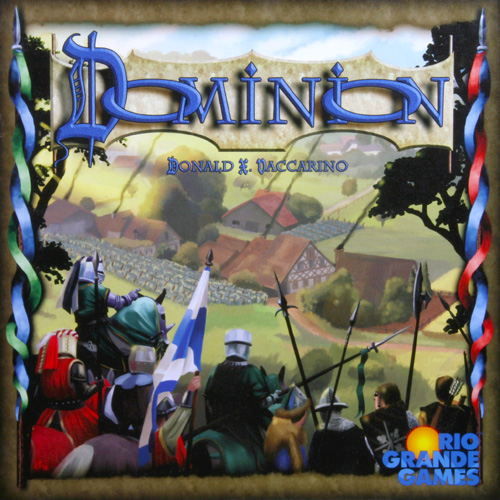Doug's Dungeon - Dominion
You arrive at the village. All you can hear around you is the ringing of hammers on newly forged steel. Odd, you think to yourself. A town of this size shouldn’t need 6 smithies, but here they all are in a row, drowning out all other noise. Asking around for the whereabouts of Doug’s dungeon, you find only confused stares and shrugged shoulders. That’s when you hear him inexplicably though the din of the forges.
Heeeeeey happy New Years n Christmas and all that! Glad to see you’re back to hear me dribble on about non-digital entertainment boxes. You like the operation I got going on here? You know the standard affair. I played a game and translated its concepts into real life for some sort of gains that aren't obviously clear for goofs. Speaking of, how familiar are you with ‘deck builder’ games? If I know my audience you may have listed Magic the Gathering, Yu-gi-oh or some other trading card game. Thing is, those games aren’t what I would list as a ‘deck building’ game. Granted, they are games where you build decks, But you aren’t playing the game itself when doing so. Building a deck is simply the preparation stage of the game. It’s not the focus. Confused? That’s fair. So I’ll go ahead and talk about Dominion.
Dominion is a pretty enormous card game in terms of scope. Players begin the game with a few estates and some cash, building up their empire to outshine all others and win. These estates, buildings, workers and even the gold you buy things with are all represented with cards. Each starting deck is 7 copper pieces and 3 estates, which are played, sent to your discard, and shuffled back up to be played again. You spend gold to buy more advanced cards that go to the discard with your cash that turn, and start showing up in your hand later. Once enough of the supplies run out, players compare how many victory points they have earned through cards to determine a winner!
Dominion is a game that is ABOUT deck building. The core of the game is to grab cards to add to your deck that will help you build your deck faster and make it more efficient. If you spend a short time googling the game, you will hear the term ‘engine’ being thrown around, and there is good reason for that. As the game progresses, your deck will go further in a single turn and produce more output as you tune it with the right ratio of cards. A player’s turn consists of the action phase, and the buy phase. In the action phase, you can only play a single action card. However, many cards you play offer another ‘action’ to play. Naturally, the backbone of any powerful deck is filled with action-giving cards that chain together. Villages are the star cards here, giving you two actions when playing it. Furthermore, playing a village lets you draw another card from your deck.
The more cards you draw, the more resources you will have to play with in terms of action cards and access to more of your money in the buy phase. Efficient decks have a good number of card-draw cards. If you want to draw cards like a madman, you’ll buy up on Smithies, which draw you a world-ending 3 cards. But don’t just go buying a million smithies right away, because they do not provide actions like Villages. If all you have in your hand is Smithies, well guess what bucko: you’re going to spend your whole turn drawing 3 cards. Great job. Us *adjusts glasses condescendingly* Dominion pros call that turn a ‘whiff’. And you want to whiff as little as possible. This is usually caused by buying too many green victory point cards early.
These green cards, known as Estates, Duchies and Provinces provide 1, 3 and 6 points for end-game scoring respectively. During the game itself, however, they are entirely useless. Players need to establish when their enormous empire engine can easily excuse earning these cards en masse without interrupting their engine’s execution. The more of these cards you have, the greater chance you have of drawing a hand of all greens, and doing absolutely nothing for a turn. Of course, buying too many more money cards can cause these problems as well. It’s all about the ratios, and finding ways to clean out your engine of inefficient parts.
The Remodel card works well for this, as you use it to ‘trash’ cards for superior ones. Trashing cards doesn’t put them in your discard but banishes them from your cardboard circle of life. An example would be trashing a copper piece that has a value of 1 using Remodel, and replacing it with a silver piece. The silver piece has a value of 2, and gives you the same value as two copper cards but only takes up a single spot in your deck. When your cards are more valuable, your card draw cards have more value! And the more value you generate, the better your turns will be, and the higher chance you have to win! AND THE MORE YOU WIN, THE MORE PEOPLE WILL LOVE YOU OH GOD SOMEONE LOVE ME! Of course, sometimes you want to hedge your bets of winning by messing with the other players flipping cards on the table, and Dominion is more than happy to provide.
Playing the Militia card causes other players to discard cards from their hands, making their next turns less reliable. The Witch card gives other players curses that are ‘-1’ victory point cards. These cards clog engines like the greens, and cripple scores at the end of the game. Not only that, but you cause opponents to spend their resources investing in cards like Chapels to mass-trash curses from their hands, putting them on the back foot where you want them. Smarter players prepare for these scenarios, buying up the blue Moat cards to protect them from any negative effects. Just like all the other cards, however, many of these attack and defense cards do not compliment your action/card draw engines, and need to be bought in moderation. Or you could just spam Witches and ruin everyone else’s day, SOPHIE.
Even if you survive the enemy attack cards and draw a bunch of cards supported by your action-giving cards, you still need to worry about the buy phase. In this phase, you dump all the money from your hand, and buy 1 card from the supplies. All cards have a set value which you must match or exceed to buy it. A small note here: you don’t trash your money to buy cards. They shuffle back in like all other cards. Flavor-wise, your money cards represent your income rather than actual treasury amount. Now let’s say you have a lot of money; enough to buy two or more cards, but you can only buy only one card as per the rules. This is when you need to buy up on cards that increase the number of things you can buy per turn. Marketplaces and Festivals increase your buying amount, but also give you more buying power, acting like money cards and increasing the value of gold you have to throw around for the turn. Solid decks are able to take great advantage of the buy phase in these ways.
Now, I’ve only listed a fraction of the cards that the core Dominion game comes with. And each game you play is set up with 10 card types. The rulebook details specific game setups that have their own defined metagame. Like the ‘interaction’ set up that focusses on attack and defense cards. Or the ‘deck size’ set-up, where players need to be mindful of the number of cards they have in their decks, due to curses and Gardens cards being available. And that ol’ internet thing has fan-made setups with their own gameplay goals. Many of these employ Dominion’s various expansions with more advanced cards, like a victory point card that gives money when played because it isn’t a lazy little jerk like its brothers and sisters.
Dominion is a game my playgroups and I have had a lot of fun with. Though I only own the core game, I know there’s still so much for me to explore. It’s deceptively simple and accessible for its size, but carries an enormous amount of depth. Now if I hadn’t gone hog-wild over the Christmas break getting new games, I’d pick up a couple of the expansions... but I barely have the space to store what I have at the moment. Speaking of, I think this delivery guy might be dropping off another game I ordered.
A courier van pulls up to the town square, causing a number of peasants to run in fear of the technological marvel. An apparently extremely heavy package is dumped at Doug’s feet and the courier drives off. Opening the box reveals not a new board game, but an anvil.
Oh yeah, I’m building another smithy, heh. Yeeeaaaaah, I think I’m going to lose this game.
Don't own Dominion yet? No problem, you can find it on our webstore here.
(Since writing this article, a second edition of Dominion has come out and can be found here. All expansions going first will be for the second ediiton, if you own a first edition copy, you can use one of these handy upgrade kits to keep expanding your... Dominion - Editor's note)

Doug Moore

I'm an avid lover of all things table top. I also have a growing collection of board games which inspire me to create my own. I put my loud and expressive personality to good use as a dungeon master for my friends, having run many campaigns through 4th and 5th edition D&D.
Follow him on Twitter
@Dugggernaut
















